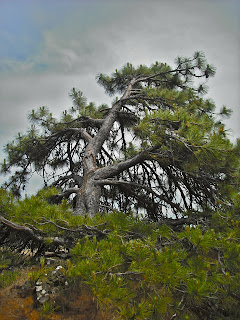I cringe when I hear Christians respond to the "spiritual but not religious" by extolling the importance of community. Yes, we all need community for spirituality. We are social creatures.
 |
They laid it at the apostles’ feet, and it was distributed to each
as any had need. Acts 4:35 NRSV Photo by Tim Graves |
But, while there is truth in this response it is based upon an unproven assumption. That is, that the "spiritual but not religious" lead the lives of hermits never talking with friends about their faith journeys. The community-defense also assumes that community must take an organized form. It does not.
More troublesome about the community-defense, however, is that it allows followers of Jesus to avoid our own failings. Too often churches are not places of community. Community is about caring for one another in deep ways. It is about assuring that everyone has their basic needs met. The reality is we spend more time worshiping consumerism and capitalism than we do sharing with our neighbor--even those within our churches.
Too many churches have within their midst those struggling in very real ways while others live in relative laps of luxury. Aside from this being contrary to the teachings of our purported savior, the attitude of the relatively wealthy community members disturbs me. In my experience, when help is provided it comes with strings and pettiness. We reflect the resentment of a culture that elevates rugged individualism to idolatry.
Within this context of blaming the victim, we operate not out of extravagant love but out of begrudging duty. We do not believe that Jesus fed the whole crowd with a few loaves and fish. We fear that if we give too much to someone, even someone within our own community, there will not be enough for us.
Jesus answered, ‘The first is, “Hear, O Israel: the Lord our God, the Lord is one; you shall love the Lord your God with all your heart, and with all your soul, and with all your mind, and with all your strength.” The second is this, “You shall love your neighbour as yourself.” There is no other commandment greater than these.’ Mark 12: 29-31 NRSV (Read in context.)
Now the whole group of those who believed were of one heart and soul, and no one claimed private ownership of any possessions, but everything they owned was held in common. With great power the apostles gave their testimony to the resurrection of the Lord Jesus, and great grace was upon them all. There was not a needy person among them, for as many as owned lands or houses sold them and brought the proceeds of what was sold. They laid it at the apostles’ feet, and it was distributed to each as any had need. Acts 4: 32-35 NRSV (Read in context.)
Trustworthy God of Abundance,
You give extravagant,
undeserved grace.
We give out of love,
limited by our human fears and worries.
Help us to trust in your abundance,
help us to love you as you love us.
Help us to give lavishly to others,
within the koinonia,
and to the whole human family.
Amen








































